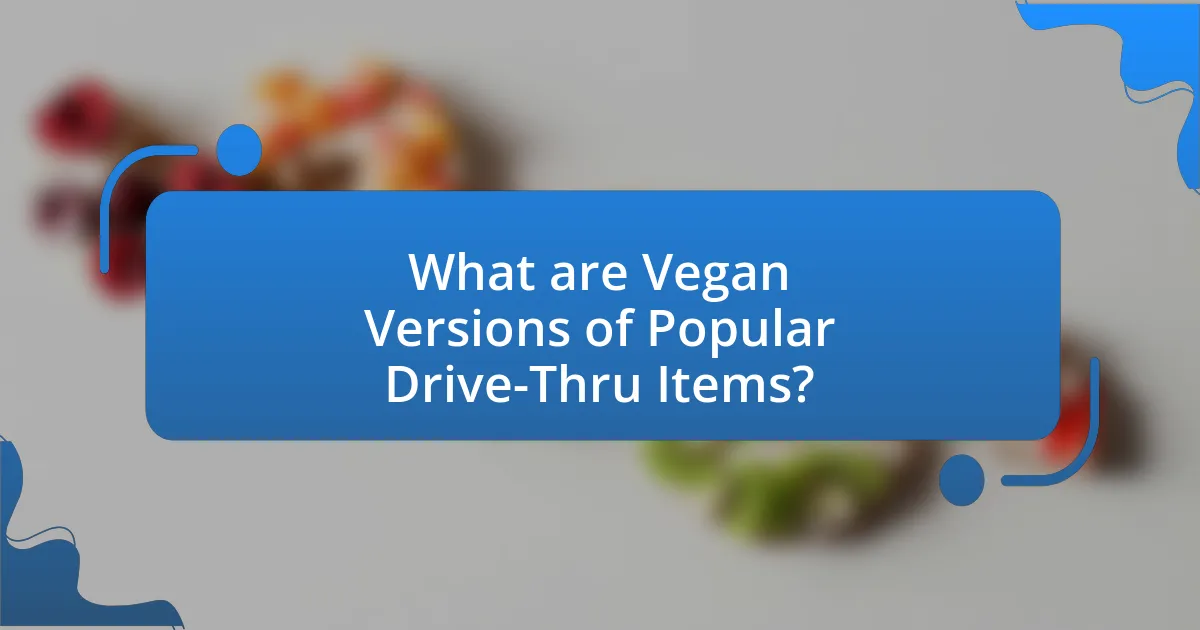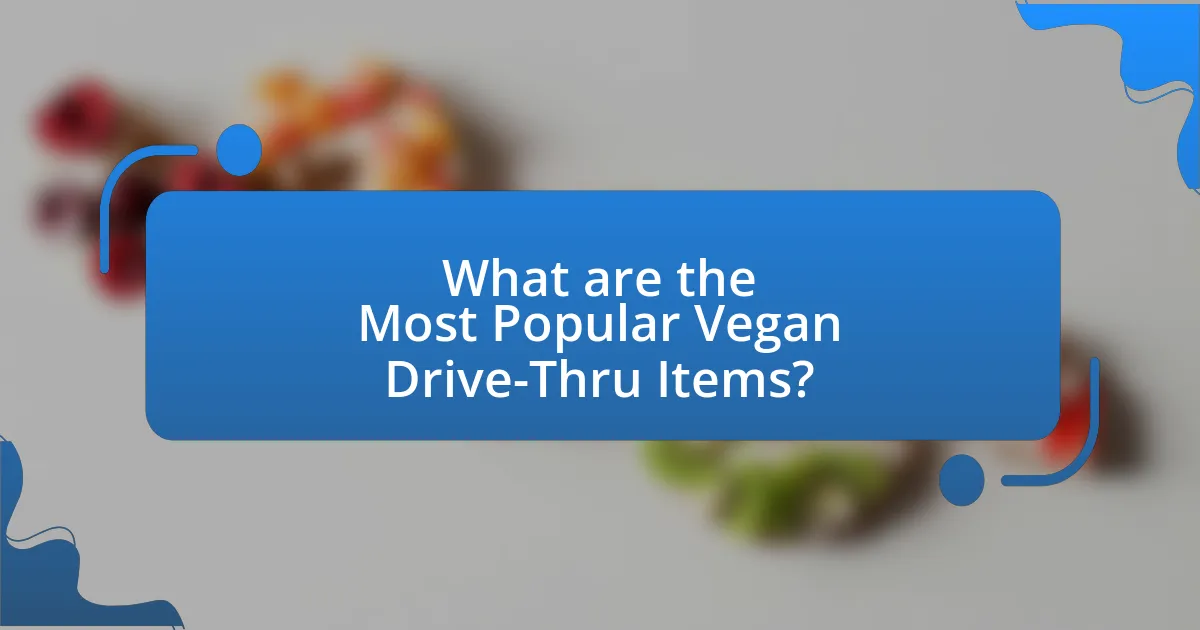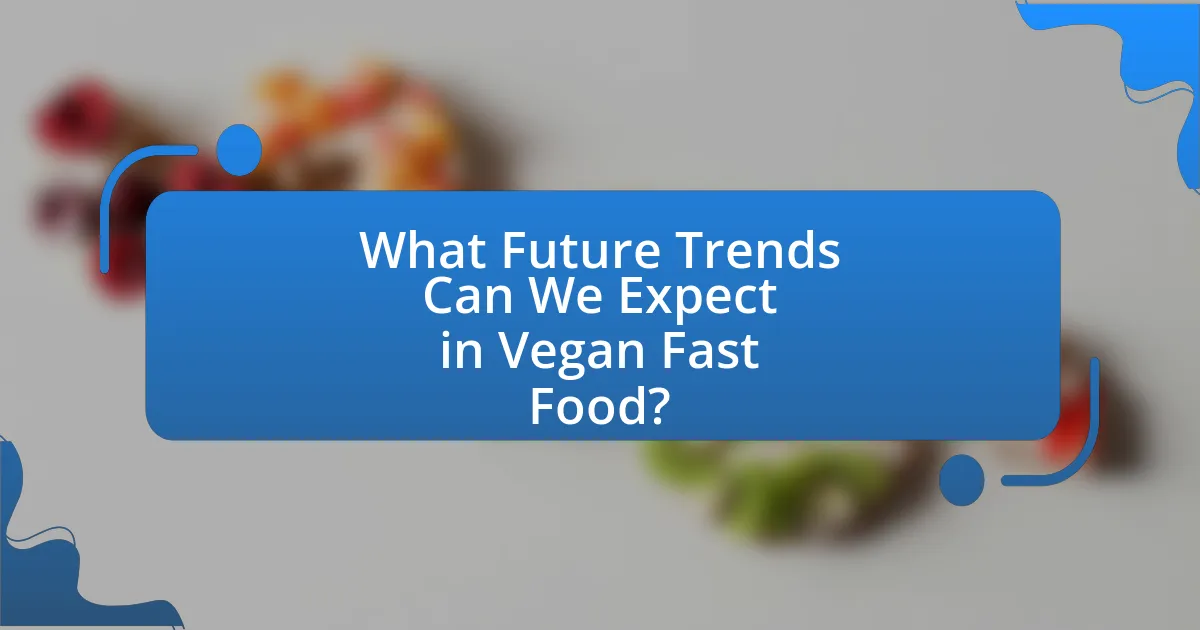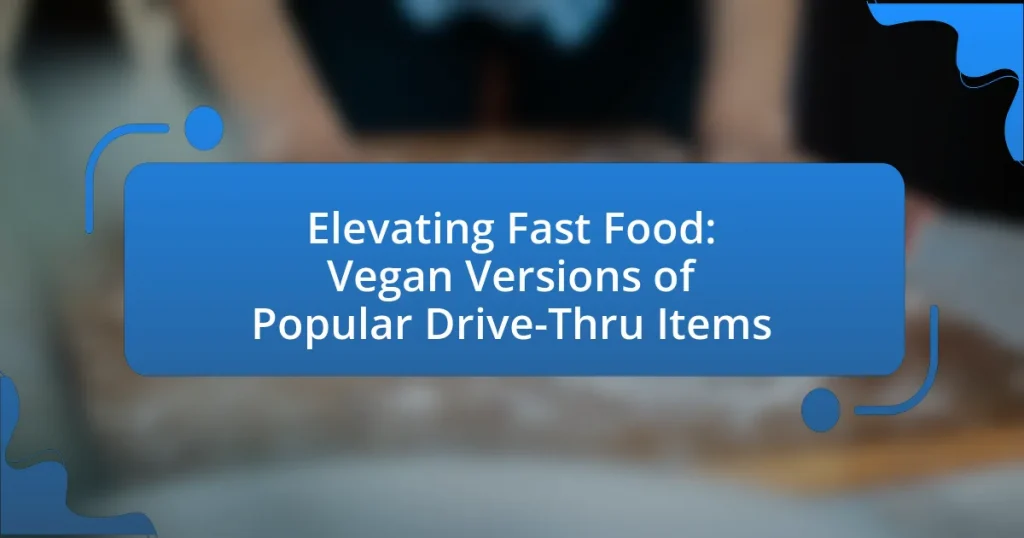The article focuses on the rise of vegan versions of popular drive-thru items, highlighting offerings such as plant-based burgers, vegan chicken sandwiches, and dairy-free milkshakes from major fast-food chains. It examines the health benefits of vegan fast food compared to traditional options, the common ingredients used, and the evolving consumer demand driven by health consciousness and environmental awareness. Additionally, the article discusses the challenges faced by fast food chains in sourcing vegan ingredients, consumer perceptions of vegan fast food, and successful examples of vegan items in the market. It concludes with insights into future trends and the impact of technology on the development of vegan fast food.

What are Vegan Versions of Popular Drive-Thru Items?
Vegan versions of popular drive-thru items include plant-based burgers, vegan chicken sandwiches, and dairy-free milkshakes. Major fast-food chains like Burger King offer the Impossible Whopper, which features a plant-based patty, while KFC has introduced Beyond Fried Chicken as a meat alternative. Additionally, many chains provide vegan options for sides, such as fries and salads, and use almond or oat milk for dairy-free beverages. These alternatives cater to the growing demand for plant-based diets, with a report from the Plant Based Foods Association indicating that the plant-based food market grew by 27% in 2020, reflecting a significant shift in consumer preferences.
How do vegan fast food options compare to traditional items?
Vegan fast food options generally offer a healthier alternative to traditional items, often containing lower levels of saturated fats and cholesterol. For example, a study published in the Journal of the American College of Cardiology found that plant-based diets can significantly reduce the risk of heart disease. Additionally, vegan fast food items frequently include more fiber and essential nutrients compared to their meat-based counterparts, contributing to better overall health outcomes.
What ingredients are commonly used in vegan fast food alternatives?
Common ingredients used in vegan fast food alternatives include plant-based proteins, vegetables, grains, and dairy substitutes. Plant-based proteins such as soy, pea protein, and lentils serve as meat replacements, while vegetables like lettuce, tomatoes, and avocados add freshness and flavor. Grains such as quinoa and brown rice provide texture and substance, and dairy substitutes like almond milk, coconut yogurt, and cashew cheese offer creamy elements without animal products. These ingredients collectively create satisfying and nutritious options that mimic traditional fast food items while adhering to vegan dietary preferences.
How do taste and texture differ between vegan and non-vegan options?
Vegan options typically have a different taste and texture compared to non-vegan options due to the absence of animal-derived ingredients. Non-vegan items often feature rich flavors and a fatty mouthfeel from meat and dairy, while vegan alternatives rely on plant-based ingredients, which can result in a lighter taste and varied textures, such as creaminess from nuts or legumes. For example, a vegan burger may use black beans or lentils, providing a different chewiness compared to a beef patty, which is dense and juicy. Studies indicate that consumers often perceive vegan products as less savory, but advancements in food technology are improving the flavor profiles and textures of vegan fast food, making them more comparable to their non-vegan counterparts.
Why is there a growing demand for vegan fast food?
The growing demand for vegan fast food is primarily driven by increasing health consciousness among consumers. Studies show that many individuals are seeking healthier dietary options, with a significant rise in plant-based diets reported; for instance, a 2021 survey indicated that 27% of Americans are reducing their meat consumption. Additionally, environmental concerns are influencing consumer choices, as the production of plant-based foods generally has a lower carbon footprint compared to animal-based products. Research from the Good Food Institute highlights that the plant-based food market is projected to reach $74 billion by 2027, reflecting a strong shift in consumer preferences towards sustainable and ethical eating habits.
What health benefits are associated with a vegan diet?
A vegan diet is associated with numerous health benefits, including lower risks of heart disease, hypertension, type 2 diabetes, and certain cancers. Research indicates that individuals following a vegan diet tend to have lower cholesterol levels and healthier body weight, which contribute to these reduced health risks. A study published in the Journal of the American Heart Association found that plant-based diets can significantly lower the risk of cardiovascular disease due to their high content of fiber, antioxidants, and healthy fats. Additionally, the World Health Organization recognizes that diets rich in fruits, vegetables, and whole grains, typical of vegan eating patterns, are linked to improved overall health and longevity.
How does environmental awareness influence consumer choices?
Environmental awareness significantly influences consumer choices by driving demand for sustainable products and practices. As consumers become more informed about the environmental impact of their purchases, they increasingly prefer brands that prioritize eco-friendly options, such as vegan fast food alternatives. Research indicates that 66% of global consumers are willing to pay more for sustainable brands, highlighting a shift towards environmentally conscious purchasing behavior. This trend is evident in the fast food industry, where the introduction of vegan versions of popular items caters to the growing preference for plant-based diets, which are perceived as more sustainable compared to traditional meat-based options.
What challenges do fast food chains face in offering vegan options?
Fast food chains face significant challenges in offering vegan options, primarily due to supply chain limitations and consumer demand. Many fast food suppliers are not equipped to provide a consistent and reliable source of high-quality vegan ingredients, which can lead to variability in menu offerings. Additionally, consumer preferences often lean towards traditional meat-based items, making it difficult for chains to justify the investment in vegan options. According to a 2021 report by the Plant Based Foods Association, the plant-based food market grew by 27% in the past year, indicating a rising interest, but still, many chains struggle to balance menu diversity with operational efficiency. This tension between meeting emerging consumer trends and maintaining cost-effectiveness presents a significant hurdle for fast food chains in expanding their vegan offerings.
How do supply chain issues affect the availability of vegan ingredients?
Supply chain issues significantly reduce the availability of vegan ingredients by disrupting the sourcing, production, and distribution processes. For instance, delays in transportation can lead to shortages of key ingredients like plant-based proteins and alternative dairy products, which are essential for vegan fast food items. According to a report by the Food and Agriculture Organization, disruptions in supply chains can lead to a 30% decrease in the availability of certain food products during crises. This directly impacts restaurants and food manufacturers that rely on consistent supplies to meet consumer demand for vegan options.
What are the perceptions of consumers regarding vegan fast food?
Consumers generally perceive vegan fast food positively, associating it with health benefits, ethical considerations, and environmental sustainability. A survey conducted by the Plant Based Foods Association in 2021 revealed that 60% of consumers are more likely to choose vegan options due to health consciousness, while 55% cite animal welfare as a significant factor in their decision-making. Additionally, 50% of respondents believe that vegan fast food can be as satisfying as traditional options, indicating a growing acceptance and demand for plant-based alternatives in the fast food industry.
How can fast food chains effectively market vegan items?
Fast food chains can effectively market vegan items by emphasizing taste, health benefits, and sustainability. Highlighting the flavor profiles of vegan options can attract both vegan and non-vegan customers, as taste remains a primary factor in food choices. Research indicates that 70% of consumers are influenced by taste when selecting food, regardless of dietary preferences. Additionally, promoting the health benefits of vegan items, such as lower cholesterol and higher fiber content, can appeal to health-conscious consumers. A study published in the Journal of Nutrition found that plant-based diets can reduce the risk of chronic diseases, which can be a compelling selling point. Lastly, emphasizing sustainability and ethical sourcing resonates with environmentally conscious consumers; for instance, a Nielsen report showed that 66% of global consumers are willing to pay more for sustainable brands. By integrating these strategies, fast food chains can effectively market their vegan offerings and expand their customer base.
What are some successful examples of vegan drive-thru items?
Successful examples of vegan drive-thru items include the Beyond Burger from Carl’s Jr., the Impossible Whopper from Burger King, and the Vegan Crunchwrap Supreme from Taco Bell. These items have gained popularity due to their taste and texture, appealing to both vegan and non-vegan customers. The Beyond Burger has been noted for its meat-like flavor and has contributed to a 68% increase in sales for Carl’s Jr. since its introduction. The Impossible Whopper has also seen significant success, with a reported 30% increase in foot traffic at Burger King locations offering it. Taco Bell’s Vegan Crunchwrap Supreme caters to the growing demand for plant-based options, showcasing the fast-food industry’s shift towards inclusivity in menu offerings.
How have major fast food brands integrated vegan options into their menus?
Major fast food brands have integrated vegan options into their menus by introducing plant-based alternatives to traditional meat products. For example, Burger King launched the Impossible Whopper, which features a plant-based patty designed to mimic the taste and texture of beef. Similarly, McDonald’s introduced the McPlant burger, made with a Beyond Meat patty, in select markets. These initiatives reflect a growing consumer demand for vegan options, with a report from the Plant Based Foods Association indicating that plant-based food sales in the U.S. grew by 27% in 2020, highlighting the market’s potential. Additionally, brands like Taco Bell have expanded their menu to include customizable vegan options, allowing customers to modify existing items to be meat-free.
What innovative recipes have emerged in the vegan fast food space?
Innovative recipes in the vegan fast food space include plant-based burgers, vegan fried chicken, and dairy-free milkshakes. These recipes often utilize ingredients like pea protein, jackfruit, and coconut milk to replicate the flavors and textures of traditional fast food items. For example, brands like Beyond Meat and Impossible Foods have developed burgers that closely mimic beef, while companies like KFC have introduced vegan chicken options made from soy and wheat protein. Additionally, vegan fast food chains are creating unique offerings such as cauliflower wings and chickpea-based sandwiches, catering to the growing demand for plant-based alternatives.

What are the Most Popular Vegan Drive-Thru Items?
The most popular vegan drive-thru items include plant-based burgers, vegan chicken sandwiches, and dairy-free milkshakes. Fast food chains like Burger King offer the Impossible Whopper, which is a plant-based burger that mimics the taste of beef, while chains like KFC have introduced vegan chicken options. Additionally, many drive-thrus now provide almond or oat milk alternatives for milkshakes, catering to the growing demand for vegan options. These items have gained popularity due to the increasing consumer interest in plant-based diets and healthier eating choices.
Which classic fast food items have successful vegan counterparts?
Classic fast food items that have successful vegan counterparts include the Big Mac, which has a vegan version made with plant-based patties and vegan sauce, and the Chicken McNuggets, now available in a plant-based format. Additionally, the Whopper has a vegan alternative featuring a plant-based patty, and Taco Bell offers a vegan Crunchwrap Supreme by substituting meat with beans or a plant-based protein. These vegan counterparts have gained popularity due to the increasing demand for plant-based options, with many fast food chains reporting significant sales growth in their vegan offerings.
How do vegan burgers compare to traditional beef burgers?
Vegan burgers generally have lower saturated fat and cholesterol levels compared to traditional beef burgers, making them a healthier option for heart health. Research indicates that a typical beef burger contains about 9 grams of saturated fat, while many vegan burgers contain less than 1 gram. Additionally, vegan burgers often provide dietary fiber, which is absent in beef burgers, contributing to digestive health. Nutritionally, vegan burgers can be fortified with vitamins and minerals, such as B12 and iron, to match or exceed the nutritional profile of beef burgers. Studies show that plant-based diets can reduce the risk of chronic diseases, further supporting the health benefits of vegan burgers over traditional beef options.
What are the best vegan alternatives to chicken nuggets?
The best vegan alternatives to chicken nuggets include products like Gardein’s Crispy Chick’n Nuggets, Beyond Meat’s Beyond Chicken Nuggets, and MorningStar Farms’ Veggie Chicken Nuggets. These options are made from plant-based ingredients that mimic the taste and texture of traditional chicken nuggets. For instance, Gardein’s nuggets are crafted from soy and wheat protein, providing a similar mouthfeel to chicken, while Beyond Meat uses pea protein to create a flavorful and satisfying alternative. MorningStar Farms offers a blend of vegetables and grains, appealing to those seeking a healthier option. These products have gained popularity due to their taste, texture, and nutritional profiles, making them suitable substitutes for those following a vegan diet.
What unique vegan items are being introduced in fast food menus?
Fast food chains are increasingly introducing unique vegan items to cater to the growing demand for plant-based options. Notable examples include Burger King’s Impossible Whopper, which features a plant-based patty designed to mimic the taste and texture of beef, and KFC’s Beyond Fried Chicken, offering a vegan alternative to their traditional chicken. Additionally, McDonald’s has launched the McPlant burger, made with a Beyond Meat patty, while Taco Bell has expanded its menu with vegan-friendly options like the Black Bean Crunchwrap Supreme. These items reflect a significant shift in the fast food industry towards accommodating vegan diets, supported by research indicating that 39% of consumers are actively trying to incorporate more plant-based foods into their diets.
How are plant-based seafood alternatives being received?
Plant-based seafood alternatives are being positively received, with increasing consumer interest and market growth. According to a report by the Good Food Institute, the plant-based seafood market grew by 23% in 2020, indicating a rising acceptance among consumers seeking sustainable and healthier options. Additionally, surveys show that 40% of consumers are willing to try plant-based seafood, reflecting a shift in dietary preferences towards more environmentally friendly choices.
What desserts are available in vegan fast food options?
Vegan fast food options typically include desserts such as dairy-free ice cream, fruit sorbets, vegan cookies, and plant-based brownies. These desserts are made without animal products, using alternatives like almond milk, coconut cream, or aquafaba. For instance, many fast food chains now offer coconut milk-based ice cream or sorbet, which is suitable for vegans. Additionally, some establishments provide vegan cookies made with ingredients like oats and nut butters, ensuring a sweet treat that aligns with vegan dietary preferences.
How do regional preferences influence vegan fast food offerings?
Regional preferences significantly influence vegan fast food offerings by dictating the types of ingredients and flavors that are incorporated into the menu. For instance, in regions with a strong cultural affinity for spicy foods, such as parts of India or Mexico, vegan fast food chains often include items like spicy chickpea burgers or jackfruit tacos to cater to local tastes. Additionally, data from market research indicates that areas with higher vegan populations, such as California, see a greater variety of plant-based options, including innovative substitutes for traditional meat items. This trend is supported by the increasing demand for vegan products, which grew by 27% in the U.S. from 2017 to 2020, reflecting a shift in consumer preferences that fast food chains are keen to address.
What are some examples of localized vegan menu items?
Localized vegan menu items include dishes that reflect regional flavors while adhering to vegan dietary restrictions. For example, in California, a popular localized vegan item is the “California Burrito,” which substitutes traditional meat with jackfruit or tofu, combined with avocado and fresh salsa. In the Southern United States, “Vegan Fried Chicken” made from seitan or chickpeas is a common offering, often served with collard greens and cornbread. In New York, “Vegan Bagels” topped with plant-based cream cheese and smoked carrots mimic traditional lox. These items not only cater to vegan diets but also celebrate local culinary traditions, making them appealing to a broader audience.
How do cultural factors shape vegan fast food trends?
Cultural factors significantly shape vegan fast food trends by influencing consumer preferences and dietary practices. For instance, in regions with strong vegetarian or vegan traditions, such as India, the demand for plant-based fast food options is higher, leading to the proliferation of vegan drive-thru items. Additionally, cultural movements emphasizing sustainability and health, particularly in Western countries, have driven fast food chains to innovate and include vegan options in their menus. According to a 2021 report by the Plant Based Foods Association, the U.S. plant-based food market grew by 27% in 2020, reflecting changing consumer attitudes towards health and environmental concerns. This shift illustrates how cultural values around health, ethics, and sustainability directly impact the availability and popularity of vegan fast food.

What Future Trends Can We Expect in Vegan Fast Food?
Future trends in vegan fast food will likely include increased innovation in plant-based meat alternatives, enhanced flavor profiles, and a focus on sustainability. Companies are investing in research and development to create more realistic textures and tastes that mimic traditional meat products, as evidenced by the rise of brands like Beyond Meat and Impossible Foods, which have gained significant market share. Additionally, consumer demand for healthier options is driving fast food chains to expand their vegan menus, with a projected growth rate of 11.9% in the global vegan food market from 2021 to 2028, according to a report by Grand View Research. This trend is further supported by the increasing awareness of environmental issues associated with animal agriculture, prompting brands to adopt eco-friendly practices in sourcing and packaging.
How is technology shaping the development of vegan fast food?
Technology is significantly shaping the development of vegan fast food by enabling innovative food processing techniques and enhancing ingredient formulations. Advances in food technology, such as 3D printing and fermentation processes, allow for the creation of plant-based alternatives that closely mimic the taste and texture of traditional meat products. For instance, companies like Beyond Meat and Impossible Foods utilize proprietary methods to create plant-based burgers that have a similar juiciness and flavor profile to beef, which has contributed to a surge in consumer acceptance. Additionally, data analytics and artificial intelligence are being employed to understand consumer preferences and optimize supply chains, leading to more efficient production and distribution of vegan fast food options. This technological integration not only improves product quality but also supports the growing demand for sustainable and health-conscious dining choices.
What role does food innovation play in creating new vegan products?
Food innovation is crucial in creating new vegan products as it enables the development of plant-based alternatives that mimic the taste, texture, and appearance of traditional animal-based foods. This innovation involves utilizing advanced food technology, such as fermentation, extrusion, and ingredient modification, to enhance the sensory qualities of vegan offerings. For instance, companies like Beyond Meat and Impossible Foods have successfully used innovative techniques to create burgers that closely resemble beef in flavor and juiciness, appealing to both vegans and meat-eaters. The rise of food innovation in the vegan sector is supported by market research indicating that the global plant-based food market is projected to reach $74.2 billion by 2027, reflecting a growing consumer demand for diverse and satisfying vegan options.
How are plant-based meat alternatives evolving?
Plant-based meat alternatives are evolving through advancements in technology, flavor profiles, and nutritional content. Companies are utilizing innovative techniques such as fermentation and extrusion to create products that closely mimic the taste and texture of animal meat. For instance, brands like Beyond Meat and Impossible Foods have developed burgers that use pea protein and heme, a molecule that gives meat its flavor, to enhance the sensory experience. Additionally, the market for plant-based meats is projected to grow significantly, with a report from Fortune Business Insights estimating it will reach $35.4 billion by 2027, indicating a strong consumer demand for these alternatives.
What consumer trends are driving the growth of vegan fast food?
The growth of vegan fast food is primarily driven by increasing consumer demand for healthier and more sustainable food options. This trend is supported by a significant rise in plant-based diets, with a 2021 survey indicating that 27% of Americans are actively trying to incorporate more plant-based foods into their diets. Additionally, concerns over animal welfare and environmental sustainability are influencing consumer choices, as studies show that 70% of consumers are more likely to choose brands that demonstrate a commitment to sustainability. The combination of health consciousness and ethical considerations is propelling the expansion of vegan fast food offerings in the market.
How does the rise of flexitarian diets impact vegan fast food sales?
The rise of flexitarian diets positively impacts vegan fast food sales by expanding the customer base to include those who are not strictly vegan but are seeking plant-based options. Research indicates that approximately 36% of Americans identify as flexitarians, leading to increased demand for vegan fast food items as these consumers look for healthier and more sustainable choices. This trend has prompted fast food chains to introduce vegan versions of popular items, resulting in a significant boost in sales; for instance, a report from the Plant Based Foods Association shows that sales of plant-based foods grew by 27% in 2020, reflecting the growing acceptance and preference for vegan options among flexitarians.
What demographic shifts are influencing vegan fast food consumption?
The demographic shifts influencing vegan fast food consumption include the increasing prevalence of younger consumers, particularly Millennials and Generation Z, who prioritize health, sustainability, and ethical eating. Research indicates that 70% of Millennials are more likely to choose plant-based options compared to older generations, reflecting a significant cultural shift towards veganism. Additionally, urbanization has led to greater access to diverse food options, with cities seeing a rise in vegan fast food outlets. This trend is supported by a 2021 report from the Plant Based Foods Association, which noted a 27% increase in plant-based food sales, driven largely by younger demographics seeking convenient, healthier alternatives.
What practical tips can consumers follow when choosing vegan fast food?
Consumers can follow several practical tips when choosing vegan fast food. First, they should check the menu for clearly labeled vegan options, as many fast food chains now offer dedicated vegan items. Second, consumers can inquire about ingredients to ensure that items are free from animal products, as some sauces or dressings may contain dairy or eggs. Third, they should consider customizing their orders, such as substituting meat with plant-based proteins or asking for no cheese. Additionally, consumers can look for third-party certifications or symbols indicating vegan status, which can help in making informed choices. Lastly, reading online reviews or using apps that specialize in vegan dining can provide insights into the best vegan fast food options available.


